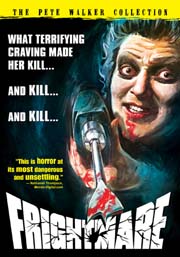 FRIGHTMARE
(1974)
FRIGHTMARE
(1974)A maverick of shamelessly
controversial and emotionally scathing horror movies that often exposed the
pale bones of cultural intolerance at the same time that his taunting and tormented
psychopaths inventively slaughtered believable characters, Pete Walker is often
maligned for his shocking yet thoughtful treatment of exploitative subjects.
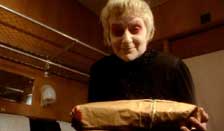
Peeling back the wounds of English society with the precision of a scalpel and the glee of a sadist, Walker managed to layer undeniably poignant cultural criticism into his horrors. As much about social injustice, intolerance, political corruption, and the general ignorance of the masses as they were about deviant sexuality, psychological aberration, and excessive violence, Walker’s features present the discerning film devotee with intellectual substance and splattery excitement.
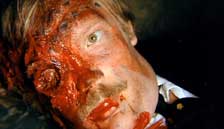 Arguably
one of Pete Walker's wettest and most substantial outings, FRIGHTMARE attacks
preconceived notions of justice and psychology while saving its most brutal
wallop for the Westernized concept of family. A gleefully malicious, trouble-making
screenplay by David McGillivray and Walker’s controlled direction follows
a miserable, emotionally hurtful premise to its anti-Hollywood ending. Treating
cannibalism as both exploitation fodder and as the terrible tool with which
he slashes his way through our belief in social institutions, his psychopathic
characters are also symbolic of familial betrayal and reflective of generational
conflict.
Arguably
one of Pete Walker's wettest and most substantial outings, FRIGHTMARE attacks
preconceived notions of justice and psychology while saving its most brutal
wallop for the Westernized concept of family. A gleefully malicious, trouble-making
screenplay by David McGillivray and Walker’s controlled direction follows
a miserable, emotionally hurtful premise to its anti-Hollywood ending. Treating
cannibalism as both exploitation fodder and as the terrible tool with which
he slashes his way through our belief in social institutions, his psychopathic
characters are also symbolic of familial betrayal and reflective of generational
conflict. 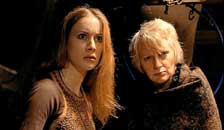
A mood setting black and white prologue reveals Dorothy Yates (Sheila Keith) sentenced to rehabilitation in a psychiatric ward for cannibalism. Her ineffectual husband Edmund (Rupert Davies), is sentenced along with her, leaving Debbie (Kim Butcher), their youngest daughter to the responsibility-riddled Jackie (Deborah Fairfax), Edmund's child from another marriage. Cut to years later, with both Dorothy and Edmund released to live an isolated life in the country. A tarot card reader, Dorothy, clearly not cured, satisfies her tastes for flesh with packages of brains brought dutifully by Jackie. When not feeding bleeding meat to her stepmother, Jackie tries to raise an increasingly violent Debbie and maintain some semblance of a social life, dating Graham (Paul Greenwood) – from whom she has kept the hideous truth hidden. Dispatching visitors who would have been better off calling the psychic hotline, Dorothy indulges in some merry meaty fun with an assortment of power drills, pokers, and sharp kitchen tools. In an ending as unsuspected as it is brutal, Jackie is betrayed by both her love for family and her spineless oaf of a father (played wonderfully by the always dependable Davies, of past Hammer and Tigon fame) in a scene that kicks your guts like a power hammer.
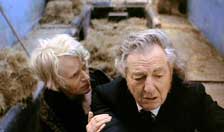 Appealing
to the very same savage instincts that he condemned in his stories of abuse,
fragmented lives, and metal sickness, Walker’s greatest achievement –
and the one that often courted the most controversy amongst the public and special
interest groups – was the unflinching honesty with which he captured the
deviation and malignance of social institutions which traditionally hide beneath
a skin of respectability. Walker attacked the power of the Church, the justice
system, and psychology with as much vigor as he slashed, shopped, strangled,
and axed his way through bodies which his camera depicted with a disturbing
mix of eroticism and debauchery. His mottos may well have been “Nothing
is sacred” and “The body is nothing but meat.” He infused
his most enduring, disturbing, shocking films with precisely these themes, energizing
the even than stale conventions of the psychological thriller and ‘slasher’
film with social commentary that was often just as troubling (and in some cases
more so) than his voyeuristically thrilling murder scenes.
Appealing
to the very same savage instincts that he condemned in his stories of abuse,
fragmented lives, and metal sickness, Walker’s greatest achievement –
and the one that often courted the most controversy amongst the public and special
interest groups – was the unflinching honesty with which he captured the
deviation and malignance of social institutions which traditionally hide beneath
a skin of respectability. Walker attacked the power of the Church, the justice
system, and psychology with as much vigor as he slashed, shopped, strangled,
and axed his way through bodies which his camera depicted with a disturbing
mix of eroticism and debauchery. His mottos may well have been “Nothing
is sacred” and “The body is nothing but meat.” He infused
his most enduring, disturbing, shocking films with precisely these themes, energizing
the even than stale conventions of the psychological thriller and ‘slasher’
film with social commentary that was often just as troubling (and in some cases
more so) than his voyeuristically thrilling murder scenes.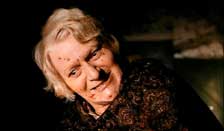
Testing limits by turning pillars of the establishment into subjects of fear, ridicule, and ineffectiveness, FRIGHTMARE is several stories artfully merged into a psychologically complex one. On the surface, it recounts the story of an elderly husband and wife freed from an insane asylum for hideous crimes of cannibalism, and a daughter whose own life is crippled by a delinquent younger sister and her sense of responsibility to them. On the other hand, Walker’s frightening fable is a condemnation of a legal system that doesn’t do its job and a psychology science that is ineffectual – particularly when facing a butcher knife! Featuring the wonderfully depraved, wholly professional, creep inducing talents Sheila Keith, an elderly Scottish actress whose demented performances should have brought her greater recognition, FRIGHTMARE sees her as Dorothy Yates, a middle-class, tweed-clad Mother-type whose thatched cottage and posturing behind high moral fiber and sermonizing disguises as insatiable appetite for human flesh and brutality.
While Walker would be the first to claim that his movies have no hidden subtext or cultural commentary, an undeniable essence of outrage against conventional moral narrow-mindedness, authority figures, and the dangers of blind conformity energize his more graphic physical fears. If not consciously instilled within his stories, such themes must have originated from some deep well of the subconscious – perhaps as simple outpourings from his personality – either way, they are there, and thank goodness, because it makes the horrors on display so much more poignant. The evil authority figures get away with their carnage while decent people, his well meaning but inept heroes and heroines usually die.
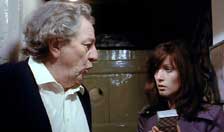 This
DVD offers Walker’s most technically accomplished film with a loving picture;
the print source is mostly clear and sharp, preserving Walker’s use of
claustrophobic, isolating frames. The vivid if low-lit colors allow us to see
Keith (in her only true leading role in a Walker film) in all her spewing, ranting
gory glory. Grain occasionally hampers the 1.85:1 anamorphic transfer, but otherwise
the image is clean and superior to the open matte Image Entertainment release
from of a few years back. English Mono and Digital Dolby 5.1 surround sound
distinguish the movie, coming through in clean, crisp audio.
This
DVD offers Walker’s most technically accomplished film with a loving picture;
the print source is mostly clear and sharp, preserving Walker’s use of
claustrophobic, isolating frames. The vivid if low-lit colors allow us to see
Keith (in her only true leading role in a Walker film) in all her spewing, ranting
gory glory. Grain occasionally hampers the 1.85:1 anamorphic transfer, but otherwise
the image is clean and superior to the open matte Image Entertainment release
from of a few years back. English Mono and Digital Dolby 5.1 surround sound
distinguish the movie, coming through in clean, crisp audio.
The extras, while not plentiful, are well crafted. The main feature is an audio commentary with Pete Walker and director of photography Peter Jessop, where the two recall working with the cast members, the challenges of lighting certain scenes, and the rabid response of critics to their films. Trailers for five other Walker movies are a treat, setting the somber, exploitative mood for thrills to come. The only real disappointment is a lackluster still gallery that is so very small that it is hardly a feature at all. This small complaint aside, Media Blaster’s presentation of FRIGHTMARE is a welcome, well-preserved addition to their commendable Walker series. (William P. Simmons)